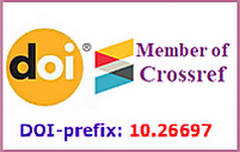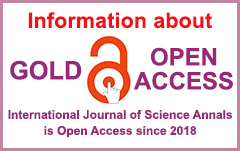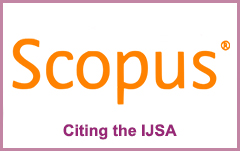Segooa M.A.1, Modiba F.S.2, Motjolopane I.3
| 1 Tshwane University of Technology, South Africa 2 Nelson Mandela University, South Africa 3 University of Witwatersrand, South Africa |
Abstract
Background and Aim of Study: Postgraduate studies in African countries face low completion rates due to capacity issues, hindering knowledge creation and innovation.
The aim of the study: to map the steps involved in conducting a systematic literature review in Information Systems (IS) research to the identified review types, thereby providing a framework based on Generative Artificial Intelligence (AI)-based design science artefact for researchers and educators in the field IS for postgraduate teaching and learning.
Material and Methods: A systematic literature review was conducted to identify the review types in IS research following Preferred Reporting Items for Systematic Reviews and Meta-Analysis guidelines. The Association of Information Systems (AIS) database was used to identify relevant articles. The initial filter produced 2775 results. When focusing only on journal articles, the record produced 221 results, resulting in five papers qualifying for inclusion in the study. These papers were augmented to eight articles using one journal article and two conference papers identified through snowballing.
Results: The results indicate that there are few publications within the AIS database on the tools used to support systematic literature review processes. However, those that exist do not reflect the type of review used. Additionally, tools that were used to support systematic literature review were those assisting with data extraction. Thus, frameworks may be needed to conduct a methodical review on various review types to ensure rigour and transparency in the findings of the reviews.
Conclusions: This paper proposes a framework to guide the design of tools that can holistically support systematic literature review processes, making these reviews more accurate and less tedious. Such artefacts, especially using Generative AI tools, could potentially support postgraduate students in conducting rigorous reviews, improving completion rates and promoting knowledge creation and innovation in African countries.
Keywords
systematic literature review, postgraduate studies, information systems, design science, teaching and learning, review types, Generative-AI, higher education
References
Aguboshim, F. C., Obiokafor, I. N., & Emenike, A. O. (2023). Sustainable data governance in the era of global data security challenges in Nigeria: A narrative review. World Journal of Advanced Research and Reviews, 17(2), 378-385. https://doi.org/10.30574/wjarr.2023.17.2.0154
Aromataris, E., Fernandez, R., Godfrey, C. M., Holly, C., Khalil, H., & Tungpunkom, P. (2015). Summarising systematic reviews: methodological development, conduct and reporting of an umbrella review approach. JBI Evidence Implementation, 13(3), 132-140. https://doi.org/10.1097/XEB.0000000000000055
Bai, Z., Jain, N., Kurdyukov, R., Walton, J., Wang, Y., Wasson, T., Zhu, X., & Chircu, A. M. (2019). Conducting Systematic Literature Reviews in Information Systems: An Analysis of Guidelines. Issues in Information Systems, 20(3), 83-93. https://doi.org/10.48009/3_iis_2019_83-93
Bandara, W., Furtmueller, E., Gorbacheva, E., Miskon, S., & Beekhuyzen, J. (2015). Achieving rigour in literature reviews: Insights from qualitative data analysis and tool-support. Communications of the Association for Information Systems, 37(1), 54-204. https://doi.org/10.17705/1CAIS.03708
Benke, I., Feine, J., Venable, J. R., & Maedche, A. (2020). On implementing ethical principles in design science research. AIS Transactions on Human-Computer Interaction, 12(4), 2006-2227. https://doi.org/10.17705/1thci.00136
Berkemeier, L., Zobel, B., Werning, S., Ickerott, I., & Thomas, O. (2019). Engineering of augmented reality-based information systems: Design and implementation for intralogistics services. Business and Information Systems Engineering, 61, 67-89. https://doi.org/10.1007/s12599-019-00575-6
Burger, P., & Fourie, F. (2019). The unemployed and the formal and informal sectors in South Africa: A macroeconomic analysis. South African Journal of Economic and Management Sciences, 22(1), 1-12. https://doi.org/doi:10.4102/sajems.v22i1.2104
Chubb, J., Cowling, P., & Reed, D. (2022). Speeding up to keep up: Exploring the use of AI in the research process. AI and Society, 37(4), 1439-1457. https://doi.org/10.1007/s00146-021-01259-0
Fusar-Poli, P., & Radua, J. (2018). Ten simple rules for conducting umbrella reviews. BMJ Menal Health, 21(3), 95-100. https://doi.org/10.1136/ebmental-2018-300014
Girard, C., Ecalle, J., & Magnan, A. (2013). Serious games as new educational tools: How effective are they? A meta‐analysis of recent studies. Journal of Computer-Assisted Learning, 29(3), 207-219. https://doi.org/10.1111/j.1365-2729.2012.00489.x
Goeken, M., & Patas, J. (2010). Evidence-based structuring and evaluation of empirical research in requirements engineering: Fundamentals, framework, research map. Business and Information Systems Engineering, 2, 175-185. https://doi.org/10.1007/s12599-010-0101-0
Granell, C., Pesántez‐Cabrera, P. G., Vilches‐Blázquez, L. M., Achig, R., Luaces, M. R., Cortiñas‐Álvarez, A., & Morocho, V. (2021). A scoping review on the use, processing and fusion of geographic data in virtual assistants. Transactions in GIS, 25(4), 1784-1808. https://doi.org/10.1111/tgis.12720
Greenhalgh, T., Thorne, S., & Malterud, K. (2018). Time to challenge the spurious hierarchy of systematic over narrative reviews? European Journal of Clinical Investigation, 48, Article e12931. https://doi.org/10.1111/eci.12931
Hassandoust, F., Techatassanasoontorn, A. A., & Tan, F. B. (2016). Factors influencing the infusion of information systems: A literature review. Pacific Asia Journal of the Association for Information Systems, 8(1), Article 2. https://doi.org/10.17705/1pais.08101
Hevner, A. R., March, S. T., Park, J., & Ram, S. (2004). Design science research in Information Systems. MIS Quarterly, 28(1), 75-105. https://doi.org/10.2307/25148625
Jennex, M. E. (2015). Literature reviews and the review process: An editor-in-chief’s perspective. Communications of the Association for Information Systems, 36, Article 8, 139-146. https://doi.org/10.17705/1CAIS.03608
Kitchenham, B., & Charters, S. (2007). Guidelines for performing systematic literature reviews in software engineering. https://legacyfileshare.elsevier.com/promis_misc/525444systematicreviewsguide.pdf
Li, B., Lowell, V. L., Wang, C., & Li, X. (2024). A systematic review of the first year of publications on ChatGPT and language education: Examining research on ChatGPT’s use in language learning and teaching. Computers and Education: Artificial Intelligence, Article 100266. https://doi.org/10.1016/j.caeai.2024.100266
Ly, C. K. (2024). Teachers’ roles on English language teaching for promoting learner-centered language learning: A theoretical review. International Journal of TESOL and Education, 4(2), 78-98. https://doi.org/10.54855/ijte.24425
March, S. T., & Storey, V. C. (2008). Design science in the information systems discipline: An introduction to the special issue on design science research. MIS Quarterly, 32(4), 725-730. https://doi.org/10.2307/25148869
Marshall, C., & Brereton, P. (2013). Tools to support systematic literature reviews in software engineering: A mapping study. International Symposium on Empirical Software Engineering and Measurement conference proceedings (pp. 296-299). IEEE. https://doi.org/10.1109/ESEM.2013.32
Melnyk, Y. B., & Pypenko, I. S. (2024). Artificial intelligence as a factor revolutionizing higher education. International Journal of Science Annals, 7(1), 8-16. https://doi.org/10.26697/ijsa.2024.1.2
Morana, S., Schacht, S., Scherp, A., & Maedche, A. (2017). A review of the nature and effects of guidance design features. Decision Support Systems, 97, 31-42. https://doi.org/10.1016/j.dss.2017.03.003
Ngwenyama, O., & Rowe, F. (2024). Should we collaborate with AI to conduct literature reviews? Changing epistemic values in a flattening world. Journal of the Association for Information Systems, 25(1), 122-136. https://doi.org/10.17705/1jais.00869
Niemoller, C., Metzger, D., Berkemeier, L., Zobel, B., & Thomas, O. (2019). Mobile service support based on smart glasses. Journal of Information Technology Theory and Application (JITTA), 20(1), Article 4. https://aisel.aisnet.org/jitta/vol20/iss1/4
Page, M. J., McKenzie, J. E., Bossuyt, P. M., Boutron, I., Hoffmann, T. C., Mulrow, C. D., Shamseer, L., Tetzlaff, J. M., Akl, E. A., Brennan, S. E., & Chou, R. (2021). The PRISMA 2020 statement: An updated guideline for reporting systematic reviews. International Journal of Surgery, 134, 178-189. https://doi.org/10.1016/j.jclinepi.2021.02.003
Paré, G., Trudel, M.C., Jaana, M. & Kitsiou, S. (2015). Synthesising information systems knowledge: A typology of literature reviews. Information and Management, 52(2), 183-199. https://doi.org/10.1136/bmj.n71
Pawson, R., Greenhalgh, T., Harvey, G., & Walshe, K. (2005). Realist review is a new method of systematic review designed for complex policy interventions. Journal of Health Services Research and Policy, 10(1_suppl), 21-34. https://doi.org/10.1258/1355819054308530
Pigott, T. D., & Polanin, J. R. (2020). Methodological Guidance Paper: High-Quality Meta-Analysis in a Systematic Review. Review of Educational Research, 90(1), 24-46. https://doi.org/10.3102/0034654319877153
Rosenthal, R., & DiMatteo, M.R. (2001). Meta-analysis: Recent developments in quantitative methods for literature reviews. Annual Review of Psychology, 52(1), 59-82. https://doi.org/10.1146/annurev.psych.52.1.59
Segooa, M. A., Modiba, F. S., & Motjolopane, I. (2025). Generative artificial intelligence tools to augment teaching scientific research in postgraduate studies. South African Journal of Higher Education, 39(1), 294-314. https://doi.org/10.20853/39-1-6275
Segooa, M.A., Motjolopane, I. M., & Modiba, F. S. (2023). Development of a design science artefact to teach computing students a systematic literature review. European Conference on Research Methodology for Business and Management Studies proceedings, 22(1), 183-191. https://doi.org/10.34190/ecrm.22.1.1414
Siemon, D., Becker, F., Meyer, M., & Strohmann, T. (2022). Addressing the practical impact of design science research. Americas Conference on Information Systems proceedings. AIS. https://aisel.aisnet.org/amcis2022/sig_meta/sig_meta/1
Smets, W. (2024). Four design principles for student learning of substantive historical concepts – a realistic review study. History Education Research Journal, 21(1), Article 4. https://doi.org/10.14324/HERJ.21.1
Spencer, S. A., Adipa, F. E., Baker, T., Crawford, A. M., Dark, P., Dula, D., & Morton, B. (2023). A health systems approach to critical care delivery in low-resource settings: A narrative review. Intensive Care Medicine, 49(7), 772-784. https://doi.org/10.1007/s00134-023-07136-2
Stefanovic, D., Havzi, S., Nikolic, D., Dakic, D., & Lolic, T. (2021). Analysis of the tools to support systematic literature reviewing software engineering. Conference Series: Materials Science and Engineering: Vol. 1163. 11th International Conference on Engineering and Technology. IOP Publishing Ltd. http://doi.org/10.1088/1757-899X/1163/1/012013
Sturm, B., & Sunyaev, A. (2019). Design principles for systematic search systems: A holistic synthesis of a rigorous multi-cycle design science research journey. Business and Information Systems Engineering, 61, 91-111. https://doi.org/10.1007/s12599-018-0569-6
Sundaram, G., & Berleant, D. (2023). Automating systematic literature reviews with natural language processing and text mining: A systematic literature review. In Yang, X.S., Sherratt, R.S., Dey, N., & Joshi, A. (Eds.), Lecture Notes in Networks and Systems: Vol. 693. Proceedings of 8th International Congress on Information and Communication Technology (pp. 73-92). Springer. https://doi.org/10.1007/978-981-99-3243-6_7
Templier, M., & Paré, G. (2018). Transparency in literature reviews: an assessment of reporting practices across review types and genres in top IS journals. European Journal of Information Systems, 27(5), 503-550. https://doi.org/10.1080/0960085X.2017.1398880
Tessema, G. A., Kinfu, Y., Dachew, B. A., Tesema, A. G., Assefa, Y., Alene, K. A., & Tesfay, F. H. (2021). The COVID-19 pandemic and healthcare systems in Africa: A scoping review of preparedness, impact and response. BMJ Global Health, 6(12), Article e007179. https://doi.org/10.1136/bmjgh-2021-007179
Tlili, A., Salha, S., Garzón, J., Denden, M., Kinshuk, Affouneh, S., & Burgos, D. (2024). Which pedagogical approaches are more effective in mobile learning? A meta-analysis and research synthesis. Journal of Computer Assisted Learning, 40(3), 1321-1346. https://doi.org/10.1111/jcal.12950
Valentine, J. C., Pigott, T. D., & Rothstein, H. R. (2010). How many studies do you need? A primer on statistical power for meta-analysis. Journal of Educational and Behavioural Statistics, 35(2), 215-247. https://doi.org/10.3102/1076998609346961
Vom Brocke, J., Hevner, A., & Maedche, A. (2020). Introduction to design science research. In Vom Brocke J., Hevner A., & Maedche A. (Eds.), Design Science Research. Cases. Progress in IS. Springer. https://doi.org/10.1007/978-3-030-46781-4_1
Wirth, J. (2018). Dependent variables in the privacy-related field: A descriptive literature review. Innovative Behavioral IS Security and Privacy Research. https://doi.org/10.24251/HICSS.2018.463
Yanwar, A. P., Sitthiworachart, J., & Joy, M. (2022). Implementing educational technology in the classroom to teach English skills: A systematic literature review. Journal of Higher Education Theory and Practice, 22(14), 148-162. https://doi.org/10.33423/jhetp.v22i14.5542
Segooa Mmatshuene Anna (Corresponding Author) – https://orcid.org/0000-0002-4190-8256;
Modiba Florah Sewela – https://orcid.org/0000-0001-6905-067X; Doctor of Literature and Philosophy in Development Studies, Senior Lecturer, Department of Development Studies, Nelson Mandela University, Gqeberha, South Africa
Motjolopane Ignitia – https://orcid.org/0000-0001-9047-6720; Doctor of Philosophy in Information Systems, Associate Professor, Digital Business Wits Business School, University of Witwatersrand, Johannesburg, South Africa.
| |
APA
Segooa, M. A., Modiba, F. S., & Motjolopane, I. (2025). Integrating generative artificial intelligence into higher education: A framework for different types of reviews. International Journal of Science Annals, 8(1), 21–31. https://doi.org/10.26697/ijsa.2025.1.2
Harvard
Segooa, M. A., Modiba, F. S., & Motjolopane, I. "Integrating generative artificial intelligence into higher education: A framework for different types of reviews." International Journal of Science Annals, [online] 8(1), pp. 21–31. viewed 30 June 2025, https://culturehealth.org/ijsa_archive/ijsa.2025.1.2.pdfVancouver
Segooa M. A., Modiba F. S., & Motjolopane I. Integrating generative artificial intelligence into higher education: A framework for different types of reviews. International Journal of Science Annals [Internet]. 2025 [cited 30 June 2025]; 8(1): 21–31. Available from: https://culturehealth.org/ijsa_archive/ijsa.2025.1.2.pdf https://doi.org/10.26697/ijsa.2025.1.2












